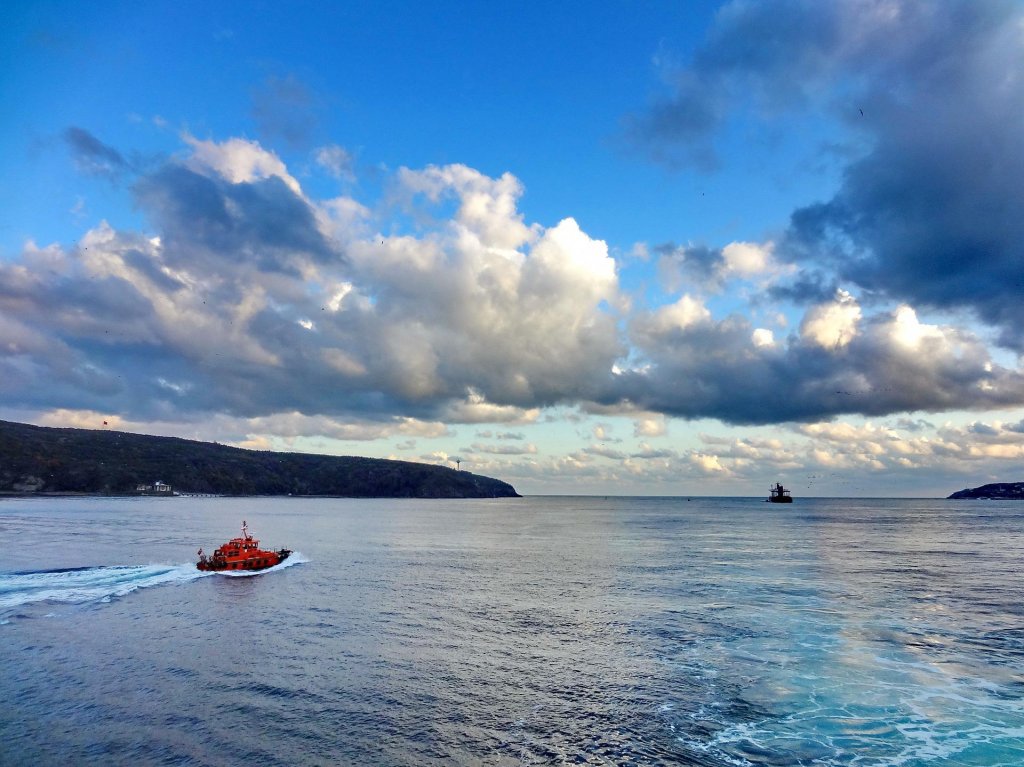Thoughts on the Montreux Convention in the light of Recent Developments – Levent Kırval-Arda Özkan

The
Turkish Straits, comprising the İstanbul and Çanakkale Straits and the Sea of
Marmara –which connects the Black Sea to the Aegean and the Mediterranean Sea–
is considered one of the most important waterways in the world from a strategic
perspective. The Turkish Straits are valuable not just because of their unique
features from an environmental context –not found anywhere else in the world– but
also because it is situated in an important geographical location. In addition,
the Turkish Straits are important for political, military, and economic
security as they serve as the main trade route connecting the Black Sea
littoral countries to world markets. Several wars were fought since ancient
times to control them.
The regulation
of passage through the Straits has also caused many conflicts. Since 1936, the transit
regime through the Straits has been smoothly managed under the Montreux
Convention. However, when wars and crises occurred in the Black Sea basin in
the post-Cold War period, especially when Turkey blocked US warships that
wanted to pass through the Straits, the regulation of passage through the
Straits became controversial again.
The
Turkish Straits are politically, economically, and strategically important, resulting
from their geographically important location to various countries. This makes
it especially significant for the littoral states of the Black Sea -Georgia,
Ukraine, Russia, Bulgaria, Romania, and Turkey. The
Montreux Straits Convention, which governs the transit regime from the Straits,
is a multilateral agreement that has been in effect since 1936. The Convention,
implementation of which is overseen by Turkey, constitutes appropriately
balanced regime between Black Sea littoral and non-Black Sea states.
The
safety of navigation in the Straits forms an integral part of the principle of
free passage proposed by the Convention. The concept of safety of navigation in
the Convention means that Turkey has the right to regulate the transit routes
within international law. The fact that passage through the Straits is
regulated by an international convention limits Turkey’s control on the Straits.
Indeed, there is a special regime in the Straits, which aims at freedom of
navigation with some limitations, formulated within the Montreux Convention.
According
to the passage regime regulated in Montreux Convention, the freedom of passage
of all states’ merchant ships through the Straits during peacetime is accepted
without restrictions. In the time of war, if Turkey is at war or feels itself
in danger of an imminent war, the freedom of passage of merchant ships is
subject to certain conditions. In the passage of warships through the Straits
during peacetime, certain limitations are kept for vessels under a specific
tonnage, such as the number of foreign ships, the notification requirement,
daytime passage and time limit. While the passage of large warships of the
states that did not have a coast to the Black Sea was prohibited, large
warships of the littoral states were allowed to pass through the Straits if
they complied with necessary notifications and the condition of crossing alone.
During wartime, if Turkey is not belligerent, ships of impartial states can
pass through the Straits as during peacetime, while ships of warring states are
prohibited from passing through the Straits. If Turkey is one of the
belligerents in time of war or if Turkey feels itself under the imminent threat
of war, Turkey can arrange the passage regime of the Straits as it wishes to
ensure its security.
However,
the maritime traffic intensity in the Turkish Straits has reached very critical
and dangerous dimensions today. While 17 ships passed through the Bosphorus daily
in 1947, this number has exceeded 150 in recent years, reaching around 50,000
annually. In addition to the increased ship traffic, ship sizes have also grown,
and the cargo quality has changed. Most ships passing through the Straits today
carry poisonous, dangerous, or explosive materials. The number of tankers
carrying oil, petroleum products and other hazardous goods through the Straits
is around 5,500 per year. This corresponds to approximately 15 tankers per day.
Maritime
traffic in the Turkish Straits already exceeds the limits of a secure passage.
This also raises the risk of accidents to critical levels. Thus, the Straits
Regulation came into force on 1 July 1994 to ensure the safety of life,
property, environment, and navigation in the Turkish Straits. Later, the
Regulation was revised in 1998 and entered into force on 6 November 1998. The
significant decrease in the number of accidents occurring in the Straits since then
has demonstrated the success and necessity of this regulation. These
regulations were prepared in harmony with the principle of freedom of passage
in international law and maritime rules introduced by the Montreux Convention as
the freedom of passage does not mean an uncontrolled and undisciplined passage.
The
Turkish Straits have always taken their place on the global agenda by
attracting the attention of the great powers of the time. The rivalry today
continues between NATO allies and Russia in this region. Considering that the
provisions of the Montreux Convention continue to protect the Straits against
NATO forces against its interests, Russia judges that the Montreux balanced
regime still provides Russia with an advantageous situation. However, during
the 2008 South Ossetia War, discussions about the implementation of the
provisions of the Convention rekindled due to the passage of warships of NATO
members from the Straits to the Black Sea. So much so that Russia argued stated
that NATO ships violated the Montreux provisions, which impose a three-week staying
time-limitation on warships of non-littoral states in the Black Sea.
Significant
geopolitical changes have occurred in the Black Sea since the end of the Cold
War, and certainly since 1936, when the Convention was signed. Bulgaria and
Romania are both EU and NATO members, while Ukraine and Georgia wish to become
members of NATO and the EU. Turkey has been a member of NATO since 1952 and a
negotiating candidate country with the EU. These developments have caused Russia
to feel being surrounded in the region. Evaluating the Black Sea basin in this
context, the USA and Russia rivalry continues here at maximum intensity.
Moreover,
Russia’s recent occupation of parts of Ukraine has created a new conflict in
the region. In this situation, discussion on the Montreux Convention’s implementation
in the event of a possible war between the West and Russia became alive. Montreux
clearly favors the littoral states of the Black Sea and permits them to have a superior
(with regards to type, tonnage, and duration) naval presence in the Black Sea. Nevertheless,
it is being challenged by the various wars and conflicts in the region, not
least by the Russia-Ukraine war, control of Abkhazia and
South Ossetia by Russia, and the NATO and EU expansion to the Black Sea
Particularly,
a military operation by the West against Russia can put the Montreux regime in
danger. As Russia today in effect occupies parts of the sovereign states of
Ukraine and Georgia, the West has implemented various sanctions and even
mentioned a military intervention. Should this take place, it will be a
difficult for Turkey to remain neutral. As a state controlling the Straits,
Turkey will certainly close the Straits to military naval traffic.
In
addition to all of these, a new development in the region is the acceptance of
Ukraine and Moldova as candidate states for the EU. The membership status of
these countries will alienate Russia in the Black Sea even more. As Russia
already feels the push from NATO expansion to the east, it will be severely
isolated in the Black Sea by the EU membership status of these states. These developments
again underline the importance of the Montreux regime. The preservation of the
Montreux Convention, regulating the security of the Black Sea, is in the
interests of the entire international community.
In
Turkey, Istanbul Canal’s construction is also on the agenda as an alternative
to the Bosphorus. In the Environmental Impact Assessment report on the Istanbul
Canal, the Çanakkale Strait is also mentioned. Such a structure that bypasses
the Turkish Straits would affect the Montreux Straits regime. It is already
argued in Turkish press that the US supports this project to provide an alternative
entry to the Black Sea for its military ships. In any case, once a project like
this is on the agenda in earnest, the Montreux regime might be opened to debate
again. As there is a war in the Black Sea region now, adding such project to
the equation, it might change the status quo.
If a discussion starts about the Montreux Convention and if drawing up a new
convention deemed necessary, the new regime will undoubtedly be disadvantageous
for Turkey. It should be remembered that the Montreux Convention was signed
before the Second World War in a more balanced international environment. This
balance does not exist today. Especially in an environment where littoral
states are at war with each other, it is almost impossible to reconstruct a
convention that favors them.
Given
this possibility, Turkey should abstain from any steps that might jeopardies
the Montreux Convention. A potential war between the West/NATO and Russia will
further aggravate this discussion. It should not be forgotten that the only sea
that the West, especially the US, has not unfettered access in the world is the
Black Sea. Undoubtedly, all related states will take this opportunity to alter
this situation. For this reason, the Montreux Convention should be supported to
the end, and the state of the Black Sea as a sea
of peace should be maintained.

Assoc. Prof. Levent Kırval, Istanbul Technical University
Levent Kırval was born in Bursa, Turkey on November 1, 1976. After graduating from TED Ankara College (Turkey) in 1994, he received his BSc in international relations (high hons) from Middle East Technical University (Ankara-Turkey) in 1998 and MSc in European politics and policy from the London School of Economics and Political Science—Department of Government (UK) in 2000, where he attended as a British Chevening/TEV Fellow. He received his PhD in political science from Ghent University (Belgium) in 2005 (dissertation title: “Legitimising the European Union: Can Supranational Identity and Efficient Welfare State Policies Be the Answer?”), where he attended as a Jean Monnet Fellow of the European Commission. Between 2006 and 2008, he has worked as post-doctoral researcher at the Political Science Department & Centre for EU Studies of Ghent University (Belgium) as a Marie-Curie Fellow (FP6/Intra-European Fellowship) of the European Commission. Currently he is working in the social sciences division of the Basic Sciences Department at Maritime Faculty of Istanbul Technical University and teaching courses/researching on international relations, European politics and policy, maritime economics and policy, and international public law.

Dr. Arda Özkan, Ankara University
Arda Özkan earned his BA and MA in International Relations from Karadeniz Technical University, and Ph.D. in Political Science and International Relations from Istanbul University. He is an assistant professor at Ankara University Faculty of Applied Sciences Department of International Trade and Logistics. He is a postdoctoral researcher at American University Washington College of Law. His research interests include international law, Turkish foreign policy, regional studies, environmental and maritime issues.
To cite this work : Levent Kırval and Arda Özkan “Thoughts on the Montreux Convention in the light of Recent Developments”, Panorama, Online , 09 September 2022, https://www.uikpanorama.com/blog/2022/08/04/tr-uk
Copyright@UIKPanorama. All on-line and print rights reserved. Opinions expressed in works published by the Panorama belongs to the authors alone unless otherwise stated, and do not imply endorsement by the IRCT, Global Academy, or the Editors/Editorial Board of Panorama.